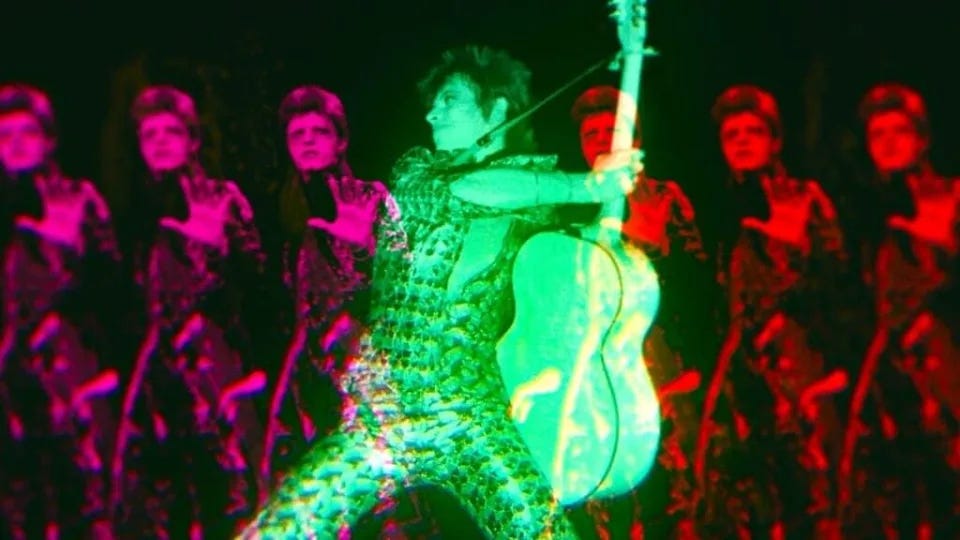Moonage Daydream
This ain't your father's rock doc, but it's a sterling example of "Sound and Vision."
Film Yap is a reader-supported publication. To receive new posts and support my work please consider becoming a free or paid subscriber.
I didn’t really become a David Bowie fan until adulthood. As a kid I mostly equated him to the dude sporting tights and an erection in Jim Henson’s 1986 directorial offering “Labyrinth.” I’m glad I finally got aboard the Bowie train as he was a visionary artist. I’m also very glad I had the opportunity to see Brett Morgen’s kaleidoscopic, psychedelic Bowie doc “Moonage Daydream” in IMAX. (The movie is set to air on HBO and stream on HBO Max sometime in the spring of 2023. I suspect since Neon is distributing to the doc, it’ll also be available to stream on Hulu at some point.)
Morgen, who took five years making the movie and suffered a heart attack during its production, is a documentarian known for tackling interesting subjects in the worlds of film (“The Kid Stays in the Picture” about famed producer Robert Evans), science (“Jane” concerning primatologist and anthropologist Jane Goodall) and most especially rock (the Rolling Stones’ “Crossfire Hurricane,” “Cobain: Montage of Heck”).
Morgen, who wrote, produced, edited and directed “Moonage Daydream,” employs an unorthodox storytelling method befitting his unorthodox subject. This isn’t your father’s rock doc. This isn’t the story of David Jones (Bowie’s real name). It’s the story of Bowie.
You get snippets about Bowie’s maternal half-brother Terry Burns (I honestly could’ve gone for more), who suffered from schizophrenia and seizures. Since he was 10 years the budding artist’s senior, Burns served as a formative tastemaker to his younger sibling. Nary a word is spoken nor an image glimpsed concerning Bowie’s first wife Angie Barnett or his children filmmaker Duncan Jones (once Zowie Bowie) and Alexandria Zahra Jones. Bowie’s marriage to the model Iman is addressed, but only briefly. (Despite their lack of presence, this is the first doc ever sanctioned by Bowie’s estate and was culled from a whopping 5 million assets from the late artist’s personal archives.)
The crux of the film concerns Bowie’s work, but since the work was personal the doc becomes personal too. Bowie’s unconventional songwriting methods are detailed as are his efforts as an actor and a painter. His time spent working with Brian Eno in West Berlin and stints in the United States and Singapore are addressed as well. Bowie’s bi-sexuality and drug use are certainly hinted at, but never dwelled upon.
Despite sitting beside a dolt at first (this dude was recording the movie on his cell phone while coughing … I masked up and moved on) and fighting sleepiness, I was glued to “Moonage Daydream.” I resisted the urge to get up and grab a caffeinated soda from the concession stand as I didn’t wanna miss any of Bowie’s bangers or bon mots - there’s a bevy of both.
At the movie’s conclusion Bowie in voiceover says, “I’ve had an incredible life – I’d love to do it again.” Morgen’s film allows fans the opportunity to revisit this life at an arm’s length. It may be a slight case of style over substance, but it’s also a sterling example of “Sound and Vision.”



